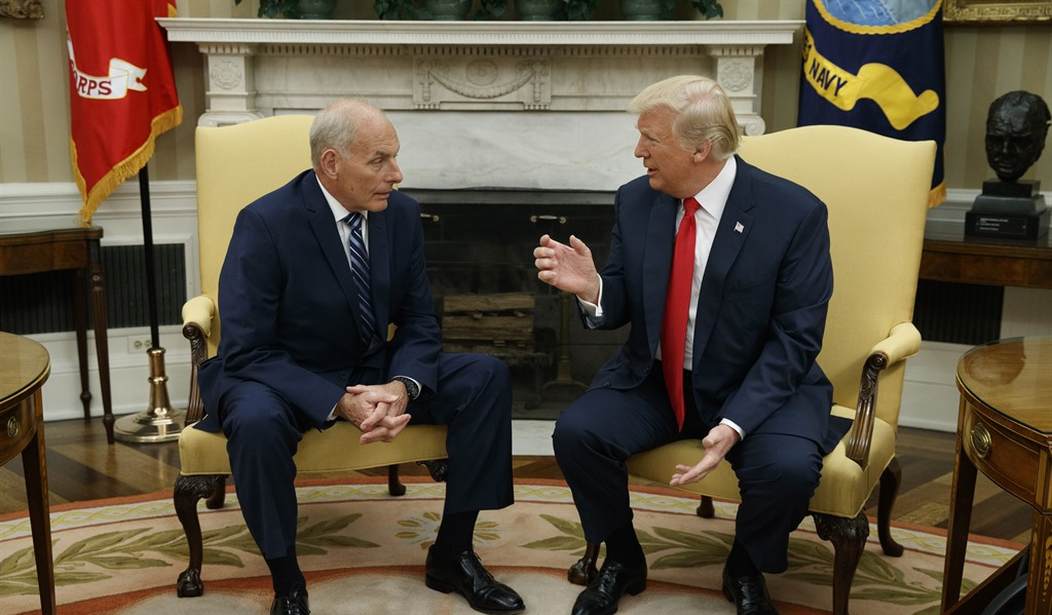Say, remember the last time a Trump aide got the cover of Time Magazine? Good times, good times. Chief of staff John Kelly gets the front-page treatment this week, along with a headline calling him “Trump’s last best hope.” That should certainly get the attention of Donald Trump, who has been known to have little patience for underlings who threaten to steal his public-relations thunder:
https://twitter.com/JGreenDC/status/895601644192321536
If the headline sounds hyperbolic, the article by Michael Duffy maintains that tone throughout. Kelly, we read, twice turned down the job before accepting it on the third attempt, and only because James Mattis, H.R. McMaster, and Joint Chiefs chair General James Dunford pleaded with him to take it. It was the only way to avoid a complete meltdown when a real crisis emerged, they reportedly argued:
Mattis, McMaster and Dunford (as well as Secretary of State Rex Tillerson) were concerned enough about the conduct of foreign policy to work together to convince a skeptical Kelly to become chief of staff. Their argument: unless someone else takes over, this White House cannot handle a real crisis. Which means that when Trump asked Kelly for the third time to be his chief of staff, it wasn’t just a job offer. It was a call of duty. …
Then in late July, when everything seemed to go haywire in the space of a few days–the sudden and disturbing rise of Scaramucci; Trump’s politicized speech to the Boy Scouts at the National Scout Jamboree; the tweet about a transgender ban in the military, which caught Pentagon generals by surprise–Kelly heard from still others out of his past. The refrain: You must do this now.
Melodramatic? Sure, but probably not inaccurate, especially after the Anthony Scaramucci debacle. The White House was running off the rails, and Kelly at the very least brought all of that to a screeching halt. That much is undeniable, and many had wondered whether Trump liked chaos among his underlings more than getting things accomplished. However, Trump gets almost no credit at all in this narrative for seeing that himself and taking steps to bring it to an end by hiring Kelly; rather, the credit goes to the generals for talking Kelly into accepting the offer Trump made.
The sure way to get an aide on the bad side of Trump is to praise him more than the boss — and to praise him at the expense of the boss. There is much of both in Duffy’s article, which also includes a glowing bio of Kelly, whose humble roots and service-oriented life might implicitly contrast with Trump too, although Duffy avoids hitting that with a rhetorical sledgehammer.
Duffy does give Trump some grudging credit in his conclusion for righting the ship, while simultaneously sounding the alarm over the influence of the military. That seems incongruous given the praise Duffy heaps on Kelly and the other generals for staging what sounds like an intervention with Trump:
Trump gets bored with people easily and has a history of blaming aides for his own missteps. Even Kelly may not be immune. One former aide who has fallen from grace suggested it was only a matter of time. But Kelly is clear-eyed about the mission: it is not so much about “fixing” Trump as it is earning the President’s trust so that he can make repairs to White House operations quickly, before an international incident tests the team.
But it is also likely that Trump knows on some level that his presidency and perhaps the nation hang in the balance. In moments of crisis, American political leaders have often turned to the nation’s military brass to guide the country with clear thinking. For the time being, current and former officers are positioned to perform double duty, providing for the common defense abroad and a measure of common sense at home. If that isn’t what the Founders had in mind when they drafted the Constitution, it is also preferable to several other possibilities that could still become reality. The arrangement bears close watching. But in the case of John Kelly, it is a reminder of what a lifetime of service to the nation can mean.
The Founders didn’t really envision a standing army at all, so we passed up their state of mind more than century ago in that sense. Bear in mind that two of the four “generals” in Duffy’s equation are retired from active duty, and that the President still made all of these decisions on his own. If he has an affinity for generals as advisers, they are still advisers. Trump can dismiss them from their appointed positions at any time he pleases, a point Duffy makes himself at the end in warning about Kelly’s standing in the long run, especially if he succeeds.
Speaking of which, how long will it take after this Time cover for Trump to publicly start complaining about his own chief of staff? Over/under is one week, and I’ll take the under. Time may get the same reputation among Trump administration officials that Sports Illustrated has among athletes for its covers.








Join the conversation as a VIP Member